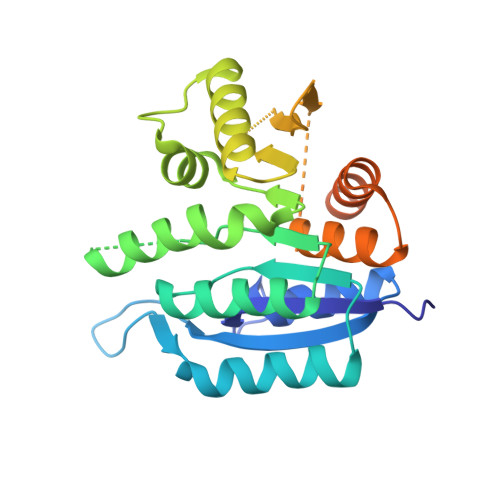Crystal structure and molecular dynamics simulations of a promiscuous ancestor reveal residues and an epistatic interaction involved in substrate binding and catalysis in the ATP-dependent vitamin kinase family members.
Gonzalez-Ordenes, F., Bravo-Moraga, F., Gonzalez, E., Hernandez-Cabello, L., Alzate-Morales, J., Guixe, V., Castro-Fernandez, V.(2021) Protein Sci 30: 842-854
- PubMed: 33555078
- DOI: https://doi.org/10.1002/pro.4040
- Primary Citation of Related Structures:
7L07 - PubMed Abstract:
Enzymes with hydroxymethylpyrimidine/phosphomethylpyrimidine kinase activity (HMPPK) are essential in the vitamin B1 (thiamine pyrophosphate) biosynthesis and recycling pathways. In contrast, enzymes with pyridoxal kinase activity (PLK) produce pyridoxal phosphate (vitamin B6), an essential cofactor for various biochemical reactions. In the ATP-dependent vitamin kinases family, the members of PLK/HMPPK-like subfamily have both enzymatic activities. It has been proposed that the promiscuous PLK activity of ancestral HMPPK enzymes could have been the starting point for this activity. In earlier work, we reconstructed the ancestral sequences of this family and characterized the substrate specificity of the common ancestor between PLK/HMPPK-like and HMPPK enzymes (AncC). From these studies, the Gln45Met mutation was proposed as a critical event for the PLK activity emergence. Here, we crystallize and determine the AncC structure by X-ray crystallography and assess the role of the Gln45Met mutation by site-directed mutagenesis. Kinetic characterization of this mutant shows a significant increase in the PL affinity. Through molecular dynamics simulation and MM/PBSA calculations some residues, important for substrate interactions and catalysis, were identified in the wild type and in the mutated ancestor. Interestingly, a strong epistatic interaction responsible for the evolutionary pathway of the PLK activity in PLK/HMPPK-like enzymes was revealed. Also, other putative mutations relevant to PLK activity in modern PLK/HMPPK-like enzymes were identified.
- Departamento de Biología, Facultad de Ciencias, Universidad de Chile, Santiago, Chile.
Organizational Affiliation:

















